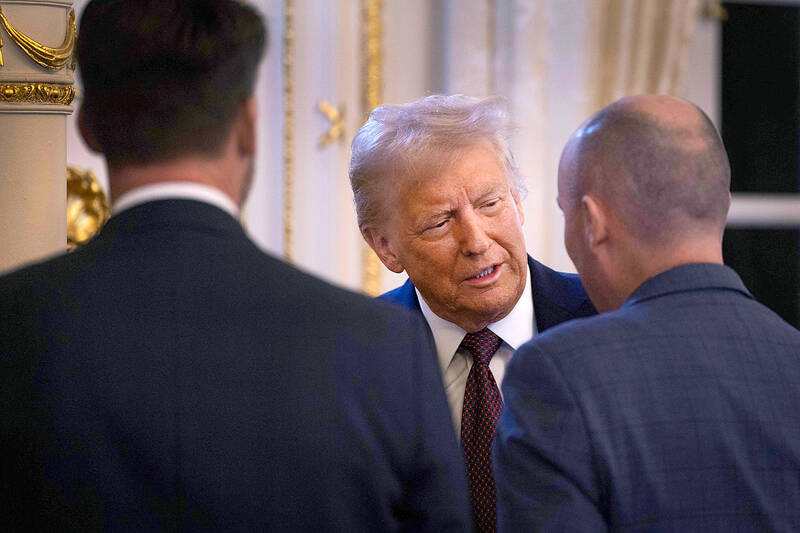US president-elect Donald Trump was to be sentenced yesterday, despite his efforts to delay the process, although the judge has indicated that Trump would not face prison.
Trump had made an 11th-hour plea for a suspension of the criminal proceedings to the US Supreme Court after a New York State appeals court dismissed his effort to have the hearing delayed and the state’s top court declined to act on the request.
However, the Supreme Court ruled that the sentencing could proceed.

Photo: AFP
Trump in May last year was convicted on 34 counts of falsifying business records, but it was expected that he would receive an unconditional discharge. The 78-year-old had potentially faced up to four years in prison.
Trump was expected to attend the sentencing virtually.
In the trial, witnesses testified that Trump had fraudulently covered up illicit payments to porn star Stormy Daniels in an effort to stop her disclosing a tryst ahead of the 2016 presidential election, which he ultimately won.
Prosecutors opposed the effort to stave off sentencing, 10 days before Trump is due to be sworn in for a second term, arguing that it was wrong for the apex court to hear the case when the mogul still had avenues of appeal to pursue in New York.
“This court lacks jurisdiction over a state court’s management of an ongoing criminal trial when defendant has not exhausted his state-law remedies,” the prosecution told the Supreme Court on Thursday.
Trump’s counsel had argued that sentencing should be postponed while he appeals his conviction, but New York state Associate Justice Ellen Gesmer rejected that on Tuesday.
Trump’s lawyers said the immunity from prosecution granted to a US president should be extended to a president-elect, but Gesmer also denied those arguments.
His attorneys had sought to have the case dismissed based on the Supreme Court’s landmark ruling last year, which said that former presidents have sweeping immunity from prosecution for a range of official acts committed while in office.

INVESTIGATION: The case is the latest instance of a DPP figure being implicated in an espionage network accused of allegedly leaking information to Chinese intelligence Democratic Progressive Party (DPP) member Ho Jen-chieh (何仁傑) was detained and held incommunicado yesterday on suspicion of spying for China during his tenure as assistant to then-minister of foreign affairs Joseph Wu (吳釗燮). The Taipei District Prosecutors’ Office said Ho was implicated during its investigation into alleged spying activities by former Presidential Office consultant Wu Shang-yu (吳尚雨). Prosecutors said there is reason to believe Ho breached the National Security Act (國家安全法) by leaking classified Ministry of Foreign Affairs information to Chinese intelligence. Following interrogation, prosecutors petitioned the Taipei District Court to detain Ho, citing concerns over potential collusion or tampering of evidence. The

‘FORM OF PROTEST’: The German Institute Taipei said it was ‘shocked’ to see Nazi symbolism used in connection with political aims as it condemned the incident Sung Chien-liang (宋建樑), who led efforts to recall Democratic Progressive Party (DPP) Legislator Lee Kun-cheng (李坤城), was released on bail of NT$80,000 yesterday amid an outcry over a Nazi armband he wore to questioning the night before. Sung arrived at the New Taipei City District Prosecutors’ Office for questioning in a recall petition forgery case on Tuesday night wearing a red armband bearing a swastika, carrying a copy of Adolf Hitler’s Mein Kampf and giving a Nazi salute. Sung left the building at 1:15am without the armband and apparently covering the book with a coat. This is a serious international scandal and Chinese

Seventy percent of middle and elementary schools now conduct English classes entirely in English, the Ministry of Education said, as it encourages schools nationwide to adopt this practice Minister of Education (MOE) Cheng Ying-yao (鄭英耀) is scheduled to present a report on the government’s bilingual education policy to the Legislative Yuan’s Education and Culture Committee today. The report would outline strategies aimed at expanding access to education, reducing regional disparities and improving talent cultivation. Implementation of bilingual education policies has varied across local governments, occasionally drawing public criticism. For example, some schools have required teachers of non-English subjects to pass English proficiency

TRADE: The premier pledged safeguards on ‘Made in Taiwan’ labeling, anti-dumping measures and stricter export controls to strengthen its position in trade talks Products labeled “made in Taiwan” must be genuinely made in Taiwan, Premier Cho Jung-tai (卓榮泰) said yesterday, vowing to enforce strict safeguards against “origin laundering” and initiate anti-dumping investigations to prevent China dumping its products in Taiwan. Cho made the remarks in a discussion session with representatives from industries in Kaohsiung. In response to the US government’s recent announcement of “reciprocal” tariffs on its trading partners, President William Lai (賴清德) and Cho last week began a series of consultations with industry leaders nationwide to gather feedback and address concerns. Taiwanese and US officials held a videoconference on Friday evening to discuss the